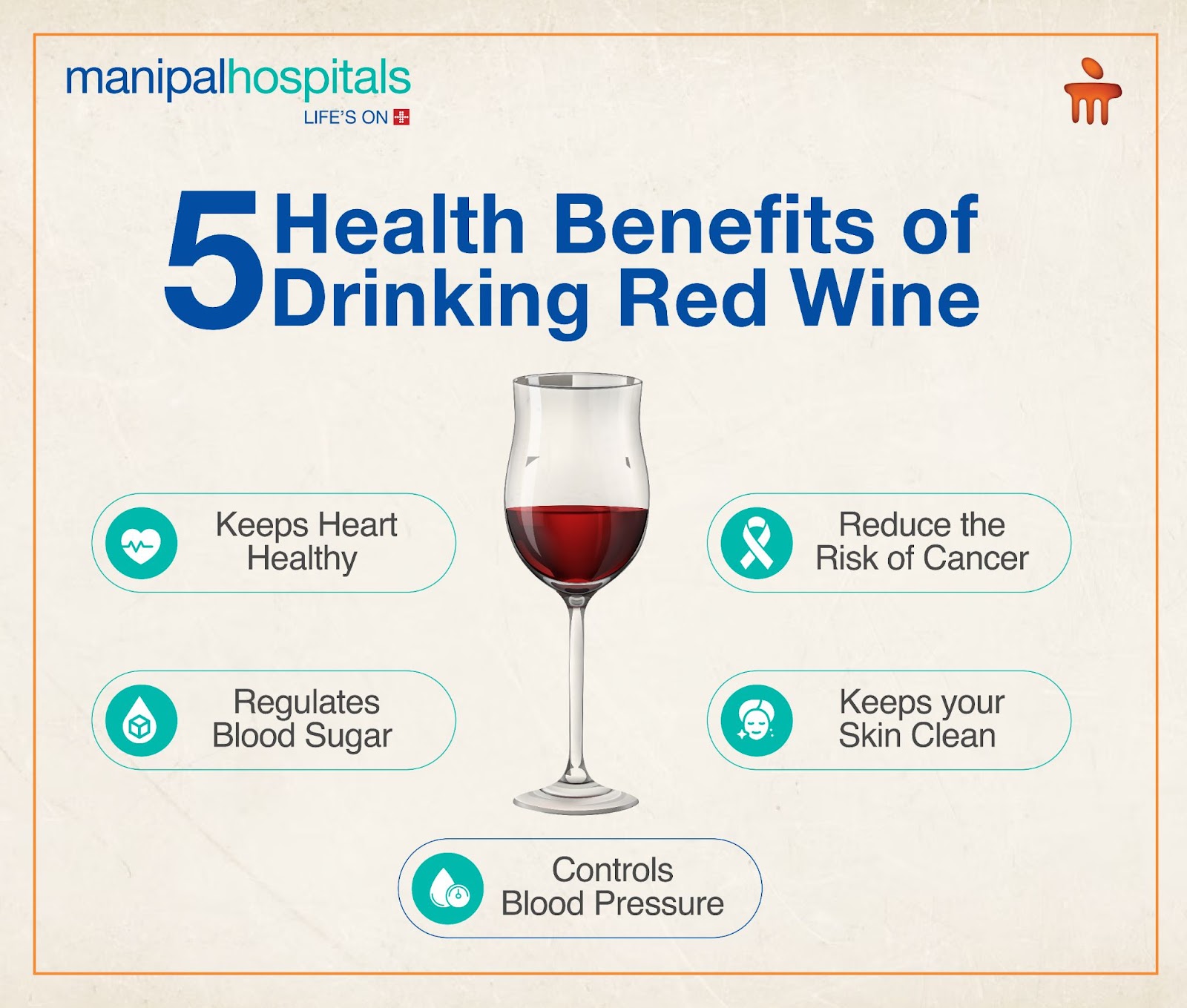
Red Wine and Its Health Benefits: Red wine, a beverage cherished for centuries, has not only been a source of pleasure for wine enthusiasts but has also gained attention for its potential health benefits. While moderation is key, indulging in a glass of red wine might offer more than just a delightful taste. In this blog, we'll explore the potential health benefits of drinking red wine, backed by scientific research. Additionally, we'll address some frequently asked questions to provide a comprehensive understanding.
It's important to note that, like any health-related topic, individual needs and conditions vary. If you're uncertain about how red wine may affect your health, or if you experience any adverse reactions, seeking guidance from a healthcare professional is recommended. With 24/7 urgent care online doctor consultations, you can easily access medical advice whenever you need it, ensuring you're making informed choices about your health and lifestyle
.
Synopsis
Types of Wines and Their Respective Health Benefits
Wine, an elixir celebrated for centuries, not only adds sophistication to our dining experiences but may also contribute to various health benefits when consumed in moderation. Let's uncork the bottle and explore the different types of wines and their unique health attributes.
1. Red Wine
Health Benefits of Red Wine:
-
Cardiovascular Health: Red wine is renowned for its heart-healthy benefits. Resveratrol, a polyphenol found in red grape skins, may enhance cardiovascular health by improving cholesterol levels and reducing blood clot formation.
-
Antioxidant Power: Packed with antioxidants like flavonoids and resveratrol, the advantage of drinking red wine encompasses combat oxidative stress, potentially lowering the risk of chronic diseases.
2. White Wine
Health Benefits of White Wine
-
Heart Health: While not as rich in resveratrol as red wine, white wine still contains antioxidants that contribute to cardiovascular health.
-
Lung Health: Some studies suggest that white wine may have a positive effect on lung function, potentially reducing the risk of respiratory diseases.
3. Rosé Wine
Health Benefits of Rosé Wine
-
Antioxidant Content: Rosé wine, made from red grape skins but with a shorter fermentation period, retains some of the antioxidants found in red wine, offering potential health benefits similar to both red and white wines.
-
Hydration: With a lower alcohol content than red wine, rosé can contribute to hydration, which is essential for overall well-being.
4. Sparkling Wine
Health Benefits of Sparkling Wine
-
Heart Health: Like other wines, sparkling wine contains antioxidants that can promote heart health.
-
Mood Enhancement: The effervescence in sparkling wine may contribute to a celebratory mood, potentially offering psychological benefits.
5. Dessert Wine
Health Benefits of Dessert Wine
-
Antioxidant Properties: While higher in sugar content, dessert wines still contain antioxidants that may provide health benefits when consumed in moderation.
-
Digestive Aid: Enjoying a small amount of dessert wine after a meal may aid digestion and contribute to a pleasant dining experience.
6. Organic and Biodynamic Wines
Health Benefits of Organic and Biodynamic Wines
-
Fewer Additives: Organic and biodynamic wines are produced with minimal additives and pesticides, potentially reducing the risk of allergic reactions or sensitivities.
-
Environmental Considerations: Choosing organic and biodynamic wines supports environmentally friendly farming practices, promoting overall ecological health.
For a consultation regarding the red wine benefits, or if you have any concerns regarding adjusting your diet, please visit the best dietitians in Bangalore at Manipal Hospitals.
5 Main Health Benefits of Drinking Red Wine

1. Heart Health
Cardioprotective Effects: Red wine contains antioxidants, such as resveratrol and polyphenols, which have been linked to cardiovascular health. These compounds may help improve cholesterol levels, reduce blood clot formation, and promote overall heart health.
2. Rich in Antioxidants
Resveratrol Power: Resveratrol, found in grape skins, is a potent antioxidant with anti-inflammatory properties. It may contribute to the prevention of chronic diseases by neutralising harmful free radicals in the body.
3. Cognitive Function
Brain Boost: Some studies suggest that moderate red wine consumption may be associated with a lower risk of neurodegenerative diseases like Alzheimer's and dementia. Resveratrol's neuroprotective properties may play a role in supporting cognitive function.
4. Blood Sugar Control
Improving Insulin Sensitivity: Resveratrol has also shown potential in improving insulin sensitivity, which could be beneficial for individuals with type 2 diabetes or those at risk of developing the condition.
5. Longevity
Unlocking the Fountain of Youth: The antioxidants in red wine may contribute to longevity by combating oxidative stress and inflammation, two factors associated with ageing.
FAQ's
Moderation is generally defined as up to one glass per day for women and up to two glasses per day for men. Each glass typically contains about 5 ounces (150 ml) of wine.
Non-alcoholic red wine and grape juice also contain resveratrol and antioxidants, but the alcohol in red wine may enhance the absorption of these compounds.
Excessive alcohol intake can lead to health problems, including liver disease, addiction, and an increased risk of accidents. Pregnant women and individuals with certain medical conditions should avoid alcohol.





















 3 Min Read
3 Min Read









